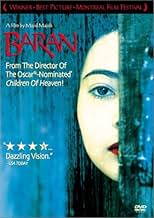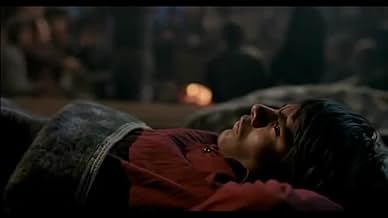IMDb-BEWERTUNG
7,8/10
9290
IHRE BEWERTUNG
Füge eine Handlung in deiner Sprache hinzuIn a building site in present-day Tehran, Lateef, a 17-year-old Turkish worker is irresistibly drawn to Rahmat, a young Afghan worker. The revelation of Rahmat's secret changes both their li... Alles lesenIn a building site in present-day Tehran, Lateef, a 17-year-old Turkish worker is irresistibly drawn to Rahmat, a young Afghan worker. The revelation of Rahmat's secret changes both their lives.In a building site in present-day Tehran, Lateef, a 17-year-old Turkish worker is irresistibly drawn to Rahmat, a young Afghan worker. The revelation of Rahmat's secret changes both their lives.
- Auszeichnungen
- 13 Gewinne & 6 Nominierungen insgesamt
Empfohlene Bewertungen
Majidi's 'Baran' is cinema at its purest. There is no background music. No prominent special effect. The female lead does not speak a word. It's filmed in the simplest way. It's not a colourful film and yet it is so stunning to look at because the raw Iranian landscape is beautifully captured. Majidi's films have always been subtle. He depicts the hardship of Afghan refugees in Iran very well especially the struggle between both the Iranians and the Afghans and the consequences. The story revolves around Lateef and the title character Baran. Initially Lateef loathes her but as his attraction towards Baran grows stronger, he is drawn towards her. Their love story is beautifully displayed as pure and innocent. Not a word is exchanged between Lateef and Baran and this simply shows that love need not be explained with words or even touch but with action and Lateef's sacrifice proves the depth of his love. Majidi also adds a touch of humour that adds to the genuine charm of the film. He makes some astonishingly clever use of symbolism such as the last scene when Lateef looks back at Baran's footprint (after she has departed), it represents the print she left on his heart. Hossein Abedini is fantastic as Lateef. His sublime transformation from the brattish, selfish and vindictive boy to the passionate, kind and selfless lover is phenomenal. Moreover the fact that a newcomer played the part makes it more incredible. The young and stunning Zahra Bahrami is equally amazing. The actress does not get one line to say yet her non-verbal acting is stupendous. The supporting cast, though most of them include non-professionals, look authentic. To me 'Baran' was truly a unique and enlightening experience. Films like this are a rare 'breed'. They are not easy to find.
10Lee-107
Something must be there in the air of Iran! How can they repeatedly make such good films? What is it about this country's landscape/culture/socio-economic circumstances that is so unique, that seems like it cannot be replicated anywhere else... I've watched many Iranian films over the years and each one of them has been a cinematic treat. Iranian filmmakers have truly raised the bar of cinema. If films are about capturing a slice of human life, presenting it as justly as possible and thereby helping us understand ourselves better, than I think Iranian filmmakers have done just that...over and over again!
'Baran' is again a gem of a film - basically a love story which beautifully talks about the prevailing socio-cultural dynamics in Iran at the time. Hossein Abedini as Lateef is excellent - your typical lovable rogue who has an insatiable propensity for mischief but is basically good at heart! Mohammad Amir Naji as Memar is absolutely endearing! You cannot help but be touched by this man's kindness and his subtle paternal attitude towards Lateef. Mohammad Amir Naji was also there in 'Children of Heaven' and even in that he was so amazing! He must be major actor in Iran or at least I hope he is! And Zahra Bahrami as Baran - a very controlled beautiful performance.
The "still sad music of humanity" reverberates in Iranian cinema all the time except that it is also complimented with refreshing doses of humour and joy revolving everyday situations and actions. Watch 'Baran' for another example of good cinema from Iran! Thankfully there's plenty of it there and plenty for us to see, enjoy and may be even learn...
'Baran' is again a gem of a film - basically a love story which beautifully talks about the prevailing socio-cultural dynamics in Iran at the time. Hossein Abedini as Lateef is excellent - your typical lovable rogue who has an insatiable propensity for mischief but is basically good at heart! Mohammad Amir Naji as Memar is absolutely endearing! You cannot help but be touched by this man's kindness and his subtle paternal attitude towards Lateef. Mohammad Amir Naji was also there in 'Children of Heaven' and even in that he was so amazing! He must be major actor in Iran or at least I hope he is! And Zahra Bahrami as Baran - a very controlled beautiful performance.
The "still sad music of humanity" reverberates in Iranian cinema all the time except that it is also complimented with refreshing doses of humour and joy revolving everyday situations and actions. Watch 'Baran' for another example of good cinema from Iran! Thankfully there's plenty of it there and plenty for us to see, enjoy and may be even learn...
This film is incredible, a visual masterpiece. Majid Majidi has the ability to make every frame and every shot beautiful and enigmatic. The story is in some scenes humorous, in others moving.
This film has lessons to teach in humanity and generosity.
It is also a window for viewers in Western countries (such as myself) whose lives are so far removed from those of the characters and real people like them. Very few films have to ability to transport you to another place so completely, as this film does.
This film has lessons to teach in humanity and generosity.
It is also a window for viewers in Western countries (such as myself) whose lives are so far removed from those of the characters and real people like them. Very few films have to ability to transport you to another place so completely, as this film does.
It is not bulky classic novels but little short stories of literature which remains in your memory long-lasting once you finished it. Majidi's films are like simple beautiful piece of art, it's same as reading Oscar Wilde or O Henry's classic short stories. He knows very well where to mark underline & where to put ellipsis in a film. Set in Iran, it tells the story of an afghani refugee working father whose leg injury threatens his family's future. A child of his starts working on behalf of his father at construction site. A young co-worker named Lateef's burning hate towards child transformed by a surprising discovery that a child is a young woman in disguise. For the first time in his life, he's in love. He keeps the secret to his heart & helps her with utter unconditional devotion that will change the whole dynamics of his life.
Well it's more difficult to make a simple artistic film than making a complex piece of art & its Simplicity & portrayal of natural emotions in his films which is striking the right chords. Silence of the girl is the most felt part of the film. And what a poetic end- the last foot print impression of the girl in his life, that even rain can't wash it away.
A beautiful piece of art.
Do I have to say Must Watch? Ratings-9.5/10
Well it's more difficult to make a simple artistic film than making a complex piece of art & its Simplicity & portrayal of natural emotions in his films which is striking the right chords. Silence of the girl is the most felt part of the film. And what a poetic end- the last foot print impression of the girl in his life, that even rain can't wash it away.
A beautiful piece of art.
Do I have to say Must Watch? Ratings-9.5/10
In Iran, when the illegal Afghan worker Najaf (Gholam Ali Bakhshi) breaks his foot in an accident in a construction of a building, his fragile son Rahmat becomes his replacement. The master Memar (Mohammad Amir Naji) makes Rahmat responsible for feeding the worker, and brings the young Lattef (Hossein Abedini), who was responsible for this task, to the heavy work. Latted becomes jealous of Rahmat, and spends a cruel treatment to him. However, when Lateef finds that Rahmar is indeed a girl called Baran (Zahra Bahrami), he falls in love for her and spends all his savings and gives his best efforts to protect her family and her.
"Baran" is a simple, human, beautiful, touching, irresistible wonderful love story. Exposing the situation of the explored Afghans refugees in Iran, after the Soviet invasion, their civil war and the Taliban regime, this movie also gives a lesson of humanity, sympathy and generosity. The actors and actresses have very realistic performances, showing an excellent direction and the character Baran does not speak any word along the story, using only her facial expression to disclose her inner feelings. And the sacrifice of Lateef to please the family of "Baran" shows the essence of a pure and platonic love. The arid and cold landscape completes the scenario of this gem. My vote is eight.
Title (Brazil): "Baran"
"Baran" is a simple, human, beautiful, touching, irresistible wonderful love story. Exposing the situation of the explored Afghans refugees in Iran, after the Soviet invasion, their civil war and the Taliban regime, this movie also gives a lesson of humanity, sympathy and generosity. The actors and actresses have very realistic performances, showing an excellent direction and the character Baran does not speak any word along the story, using only her facial expression to disclose her inner feelings. And the sacrifice of Lateef to please the family of "Baran" shows the essence of a pure and platonic love. The arid and cold landscape completes the scenario of this gem. My vote is eight.
Title (Brazil): "Baran"
Wusstest du schon
- WissenswertesBaran, the female protagonist, does not say a single word throughout the film.
- PatzerWhen Lateef travels to meet Soltan, director 'Majid Majidi' is reflected in the glass in the bus.
- Zitate
Afghan cobbler: A man alone is a neighbor of God.
Top-Auswahl
Melde dich zum Bewerten an und greife auf die Watchlist für personalisierte Empfehlungen zu.
- How long is Baran?Powered by Alexa
Details
Box Office
- Bruttoertrag in den USA und Kanada
- 125.900 $
- Eröffnungswochenende in den USA und in Kanada
- 21.702 $
- 9. Dez. 2001
- Weltweiter Bruttoertrag
- 166.988 $
- Laufzeit
- 1 Std. 34 Min.(94 min)
- Sound-Mix
- Seitenverhältnis
- 1.85 : 1
Zu dieser Seite beitragen
Bearbeitung vorschlagen oder fehlenden Inhalt hinzufügen























